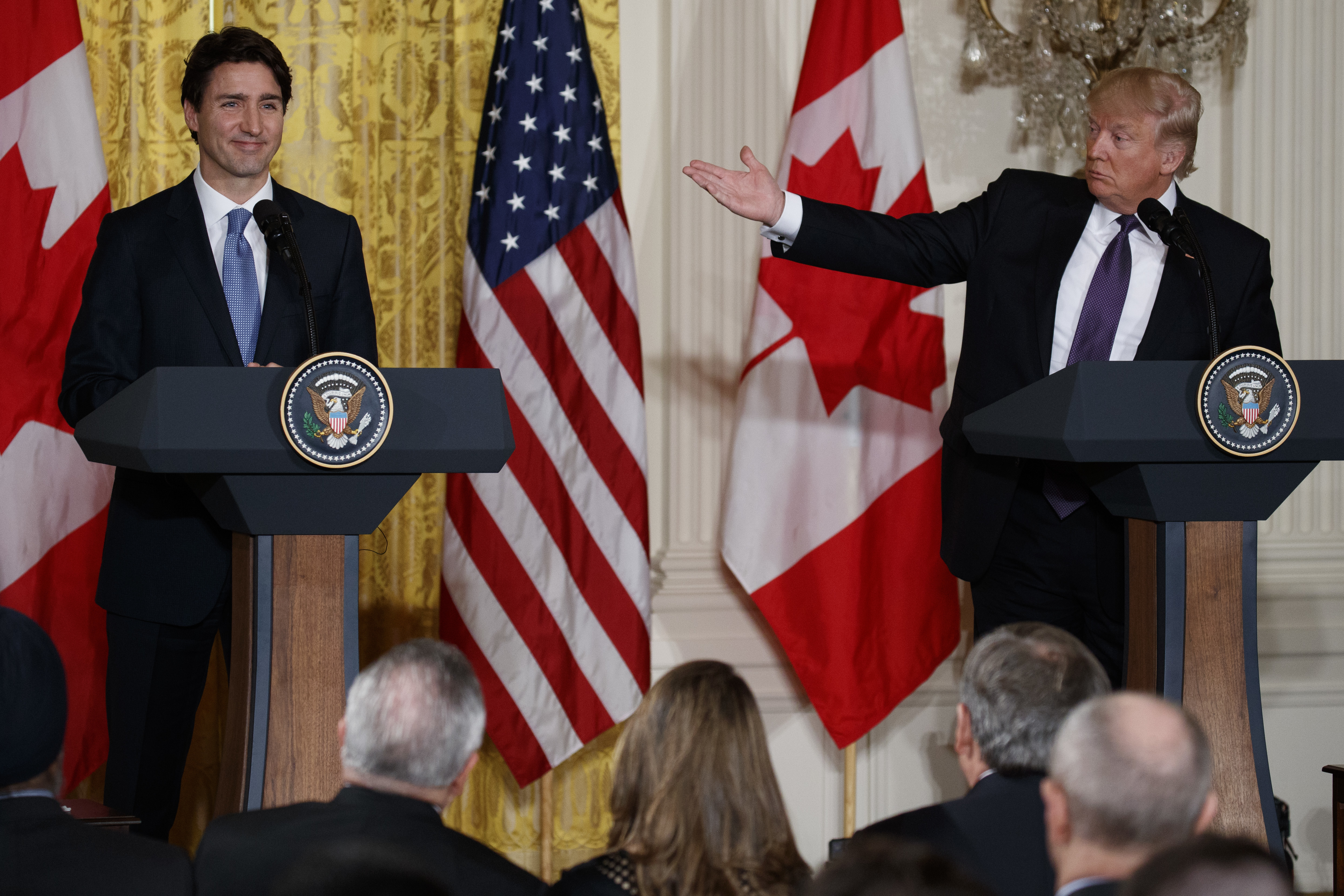Trump seems intent on starting a trade war. How about Canada?
After all, it could be worse ...

A free daily email with the biggest news stories of the day – and the best features from TheWeek.com
You are now subscribed
Your newsletter sign-up was successful
As a general matter, trade wars should be avoided, because they cannot be won.
President Trump, however, seems determined to start one. And in that light, his decision to slap a 24 percent tariff on Canadian lumber is less ominous than it might appear. Indeed, maybe a trade war with Canada wouldn't be so bad after all.
Trump's announcement caused consternation in Ottawa, especially after Trump followed up with a warning that Canadian lumber interests were not his only concern.
The Week
Escape your echo chamber. Get the facts behind the news, plus analysis from multiple perspectives.

Sign up for The Week's Free Newsletters
From our morning news briefing to a weekly Good News Newsletter, get the best of The Week delivered directly to your inbox.
From our morning news briefing to a weekly Good News Newsletter, get the best of The Week delivered directly to your inbox.
"People don't realize Canada's been very tough on the United States," Trump added later that day, signing an executive order intended to promote American agriculture. "They've been outsmarting our politicians for years."
Trump has, of course, made no secret of his skepticism of free trade. As a candidate he described NAFTA as "the worst trade deal in the history of the world"; one of his first executive actions formally withdrew the United States from negotiations on the Trans-Pacific Partnership. We've heard this kind of rhetoric from Trump before, too — often enough to suggest that his protectionist instincts are real, and rooted in some kind of liminal anxiety. "When was the last time anybody saw us beating, let's say, China in a trade deal? They kill us," Trump said on June 16, 2015, announcing his bid for the presidency. A few moments later, he turned his attention to Mexico: "They're laughing at us, at our stupidity. And now they are beating us economically."
Trump's lumber and dairy broadsides were really only surprising insofar as he's never specified Canada, our second-largest trading partner, as a culprit in the past. It's not clear what spurred him to do so in April, after several months of unruffled bilateral relations. In February, Trump welcomed Canadian Prime Minister Justin Trudeau to the White House; in March, his daughter Ivanka joined Trudeau in New York for a Broadway show. But the abrupt change of tone was, in its way, reassuring. Trump is clearly convinced that he can negotiate better trade deals for the United States than his predecessors did, and his supporters want him to try. And if we're going to risk a trade war with somebody, Canada is a much better option than China or Mexico.
Trump's differential focus on the latter two countries up to this point makes sense given his insistence that trade deficits are a measure of how badly a country is beating us. Most economists object to this interpretation, of course, just as they persist in arguing that job losses in the manufacturing sector are largely due to automation and productivity gains, rather than other countries stealing our jobs. ("Stripped from our countries like we're babies," in Trump's telling.)
A free daily email with the biggest news stories of the day – and the best features from TheWeek.com
In any case, when it comes to China, the policy wonks are on their back foot. The value of our imports from China vastly exceeds the value of our exports to them. In 2016 China spent just $116 billion on American goods and services. Americans spent roughly $463 billion on theirs, in part because of the kind of contentious trade practices that Trump has referenced, such as dumping steel. Confronting China directly about such things, however, would necessarily involve — well, confronting China directly. Doing so may be worthwhile, but it is not without attendant risks. In April, Trump's calls for an investigation on the subject were met with threats of retaliatory action from Beijing. Concurrently, North Korea was preparing for another missile test.
A trade war with Mexico would carry considerably less geopolitical risk. It would, however, be awkwardly tantamount to a trade war with ourselves, given how integrated the two economies have become since NAFTA went into effect in 1994. The United States and Mexico have, for example, developed a joint manufacturing platform; a blanket tariff on imports, as Trump once suggested, would be a blow to American exporters of intermediate parts, as well as consumers. And the bilateral relationship, for obvious reasons, is a bit strained as it stands.
By contrast, a trade war with Canada would be a relatively straightforward affair; the skirmishes in April suggested as much. Trudeau, in a call with Trump, denounced the lumber tariff as "unfair," and vowed to "vigorously defend the interests of the Canadian softwood lumber industry"; he added that when it comes to dairy products, Canada is the one with the trade deficit.
Such disputes might lead to protectionist policies that would hurt consumers and businesses on both sides of the border. But they would also give Trump a chance to illustrate the advantages of the "economic nationalism" he espouses. "I believe in free trade, but it also must be fair trade," he explained in February, in his first address to Congress. It's hard to assess the merits of that approach, since it remains unclear what Trump means, exactly, much less whether his vision can be achieved. But it's also unclear whether Trump can be deterred; on April 26, he mulled an executive order that would have withdrawn the United States from NAFTA outright. A trade war between the United States and Canada wouldn't be ideal. But the type of skirmishes we saw in April might prove to be a useful distraction.